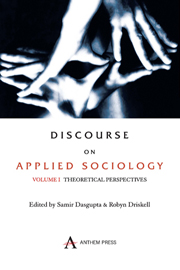Book contents
- Frontmatter
- Contents
- Preface and Acknowledgement
- Contributors to this Volume
- List of Abbreviations
- Introduction
- 1 Re-Orient World History, Social Theory and the Nineteenth Century
- 2 The Unique Complexity of Social Phenomena and the Uses of Social Science Knowledge
- 3 Unlimited Love, Compassion and Forgiveness: Acts of Moral Examplars
- 4 Theoretical Application
- 5 Applied Sociology's Need to Rethink the Tradition: Sociological Theorizing in a Global Framework
- 6 Social Analysis and Social Action
- 7 The Applied Sociologist as Craftsman
- 8 Applied Sociologists: Its Problems and Prospects
- 9 Sociology and its Application in Society: Giving Sociology its ‘Working’ Meaning
- 10 The Evolution of Sociology Back to its Applied Future
- 11 Contemporary Corporate Crime: Theoretical Perspectives, Cases & Consequences
- Index
5 - Applied Sociology's Need to Rethink the Tradition: Sociological Theorizing in a Global Framework
Published online by Cambridge University Press: 05 March 2012
- Frontmatter
- Contents
- Preface and Acknowledgement
- Contributors to this Volume
- List of Abbreviations
- Introduction
- 1 Re-Orient World History, Social Theory and the Nineteenth Century
- 2 The Unique Complexity of Social Phenomena and the Uses of Social Science Knowledge
- 3 Unlimited Love, Compassion and Forgiveness: Acts of Moral Examplars
- 4 Theoretical Application
- 5 Applied Sociology's Need to Rethink the Tradition: Sociological Theorizing in a Global Framework
- 6 Social Analysis and Social Action
- 7 The Applied Sociologist as Craftsman
- 8 Applied Sociologists: Its Problems and Prospects
- 9 Sociology and its Application in Society: Giving Sociology its ‘Working’ Meaning
- 10 The Evolution of Sociology Back to its Applied Future
- 11 Contemporary Corporate Crime: Theoretical Perspectives, Cases & Consequences
- Index
Summary
Applied sociology differs from basic sociology as it is explicitly and consciously focused on providing information and insights relevant to particular pragmatic social concerns and is designed to assist in addressing a perceived social problem or organizational shortcoming. In other words, applied sociology attempts to translate research into practical action, while basic sociological research in its purest form seeks to advance knowledge for the sake of acquiring knowledge itself. Posed in these terms, it appears that applied research and basic research are stark dichotomies. The former is typically viewed as making use of the developments of the latter in a derivative way (in this regard, the role of applied sociologists is similar to that of engineers or doctors), while it is in the realm of basic research that substantive theoretical, methodological and empirical advances are made (Bulmer, 1992). However, in real world sociology the two are often far more interconnected than the above-mentioned portrayal might suggest, with applied research at times advancing sociological understanding in significant ways and basic research frequently being directly applied to specific social concerns (Lazarsfeld and Reitz, 1975).
While applied and basic researchers share a common sociological tradition, both theoretically as well as methodologically, there is a structural or contextual difference that serves to distinguish them. Applied sociologists work for clients who are responsible for defining the social issues or problems in question and setting the parameters of research agendas.
- Type
- Chapter
- Information
- Discourse on Applied SociologyTheoretical Perspectives, pp. 135 - 156Publisher: Anthem PressPrint publication year: 2007



